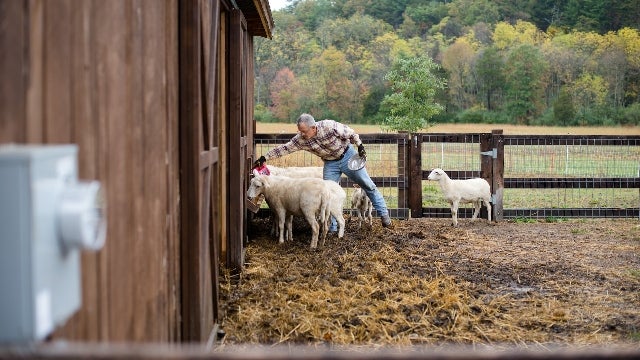5 Fall Challenges for Homesteaders and How to Manage Them
Martin Banks 11.17.23

Fall is a busy time for homesteaders as it’s time to prepare your land for winter. Once the cold snaps arrive, doing work around your property becomes more challenging. Now is the time to get busy and ensure your farm is ready when temperatures dip below freezing. While winter preparation is necessary, it can be taxing for the average homesteader. Here are five homesteading challenges in the fall and recommendations for dealing with them.
Homesteading Coverage on AllOutdoor
- AllOutdoor Review – Henry Homesteader 9mm Carbine
- Home On The Range #022: Firearms on the Homestead
- Modeling a Homestead After The Middle Ages
- Homesteading After a Collapse
- Good Chicken Breeds for Urban Homesteaders
1. Challenges for Homesteaders – Early Sunsets
The first challenge is something you don’t have much control over. Daylight saving time (DST) ends in early November, setting most Americans back an hour. While many enjoy the extra hour of sleep, DST means the sun sets much earlier than it did in the summer. Daylight is critical for completing outdoor tasks and you don’t want to be in the dark if you can avoid it.
Manage DST by adjusting your schedule with the time change. Shift your daily chores back at least an hour to beat the sunset and keep your animals comfortable. Research shows animals enjoy their daily routine, so ease your cows and chickens into the time shift.
2. Challenges for Homesteaders – Prepping Animals for the Cold
While time change can be difficult for animals, their most significant concern will be the cold weather. The National Oceanic and Atmospheric Administration says El Niño will bring above-average temperatures in most of the country in 2023-2024, which is good news for northern climates. Still, the harsh winter storms will make the season dangerous for your animals. Some species tolerate the cold better than humans. Still, take these precautionary measures to ensure their safety in the fall and winter:
- Shelter: The first step should be to fortify their shelter. Ensure your animals have a safe, warm and dry place to rest at night when the temperatures reach their lowest. Install heat lamps and ensure the barn has adequate insulation and ventilation to maintain comfort.
- Water: While water is critical in the hot summer, your animals still need just as much once the air becomes drier and colder. Warm the water for your animals using commercial heaters, insulated troughs or heated buckets to keep your animals safe.
- Food: Food is the last part of the trifecta of necessities. Cold weather means animals will expend more energy doing their daily routine, so slowly increase their food supply in the fall. Increase their calorie intake to prepare them for the cold.
3. Challenges for Homesteaders – Fortifying the House
You’ll also need protection from the cold, so fortifying your house ahead of the cold weather is essential for comfort all season. Here are a few ways to make your home safe and secure in harsh conditions:
- Chimney Maintenance: Fireplaces provide warmth and lovely aesthetics for the holidays. Unfortunately, they can become dirty and dangerous for your home. If you don’t clean the chimney, blockages can cause fire hazards or lead to a backflow of carbon monoxide (CO). Thoroughly clean your flue with a handled brush before winter arrives.
- Insulating: Cracks and gaps can make your home less energy efficient due to lost heat. Use caulk and weatherstripping to seal air leaks and mitigate water damage from the snow.
- Self-Defense: Crime doesn’t care what season it is. Wintertime can make self-defense more challenging, so consider tactics to stay ready for attacks. For example, consider a boot holster to have easy access while driving.
4. Challenges for Homesteaders – Winterizing Vehicles
Like your animals, your vehicles will need attention this fall. Transitioning to cold weather negatively affects your cars, trucks and SUVs, so prepare your vehicles in the fall with these tips so they’re ready for the first freezes of winter:
- Charge the Battery: Cold weather harms your battery capacity, so inspect your battery level and charge it before freezing temperatures ruin your device.
- Inflate the Tires: Temperature drops mean your tire pressure will decrease accordingly due to the air condensing. Ensure your pounds per square inch (psi) meets the manufacturer’s recommendations.
- Swap for the Winter Blend: Winter blend gasoline is more conducive for vehicles because it has a higher Reid vapor pressure. The fuel evaporates easier at lower temperatures, making your vehicles more efficient.
5. Challenges for Homesteaders – Decluttering the Property
Colder weather means more time spent inside, so fall is an excellent time to declutter and make room for the things you need to bring indoors. Start with the barn and shed and make your way around the property. Ask your friends and family if they want something of yours before you throw it away. Alternatively, you could sell your items on online classifieds and make some extra cash.
Using Fall for Safer Winters
Fall is a welcome sign for those awaiting relief from the hot summer. The season brings harvest time and holiday cheer, but it also comes with challenges for homesteaders. Fall weather may be short-lived before heavy snowfall arrives, so complete these five fall tasks to prepare for the winter.
